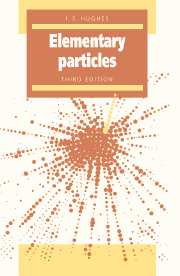Book contents
- Frontmatter
- Contents
- Preface to the third edition
- Preface to the first and second editions
- Acknowledgements
- 1 Accelerators, beams and detectors
- 2 Pions and Muons
- 3 Conservation laws
- 4 Strong, weak and electromagnetic interactions
- 5 Strange particles
- 6 Spin and parity of the K-mesons and non-conservation of parity in weak interactions
- 7 Weak interactions: basic ideas
- 8 Invariance under the CP and T operations, properties of K0-mesons
- 9 Strongly-decaying resonances
- 10 SU(3) and the quark model: classification and dynamic probes
- 11 Weak interactions and weak–electromagnetic unification
- 12 New flavours
- 13 Quark and gluon interactions
- 14 Higher symmetries
- 15 Particle physics and cosmology
- 16 Epilogue
- Appendix A Relativistic kinematics and phase space
- Appendix B Clebsch–Gordan coefficients and particle properties
- References
- Index
8 - Invariance under the CP and T operations, properties of K0-mesons
Published online by Cambridge University Press: 05 June 2012
- Frontmatter
- Contents
- Preface to the third edition
- Preface to the first and second editions
- Acknowledgements
- 1 Accelerators, beams and detectors
- 2 Pions and Muons
- 3 Conservation laws
- 4 Strong, weak and electromagnetic interactions
- 5 Strange particles
- 6 Spin and parity of the K-mesons and non-conservation of parity in weak interactions
- 7 Weak interactions: basic ideas
- 8 Invariance under the CP and T operations, properties of K0-mesons
- 9 Strongly-decaying resonances
- 10 SU(3) and the quark model: classification and dynamic probes
- 11 Weak interactions and weak–electromagnetic unification
- 12 New flavours
- 13 Quark and gluon interactions
- 14 Higher symmetries
- 15 Particle physics and cosmology
- 16 Epilogue
- Appendix A Relativistic kinematics and phase space
- Appendix B Clebsch–Gordan coefficients and particle properties
- References
- Index
Summary
The TCP theorem
The TCP theorem, derived in different forms by several workers (Schwinger in 1953, Luders in 1954 and Pauli in 1955), states that for locally interacting fields, a Lagrangian which is invariant under proper Lorentz transformations is invariant with respect to the combined operation TCP. By the operation TCP is meant the set of operations time reversal, charge conjugation (i.e. particle-antiparticle exchange) and the parity transformation, taken in any order. The proof applies only to the combined set of operations even though the theory may not be invariant under the individual operations T, C and P.
It is an obvious consequence of the TCP theorem that if an interaction is not invariant under one of the operations it must also fail to be invariant under the product of the other two.
We have already seen that for weak decays parity is not conserved, so that if these processes are to be invariant under time reversal they cannot be invariant under charge conjugation. A number of tests have demonstrated that this is in fact the case. For instance, in the decay of muons we have already mentioned that the decay electrons are fully polarised. If charge conjugation holds, we should expect that the helicity of the positron from µ+-decay should be the same as that of the electron from µ--decay, since these two processes are the charge conjugates of each other and since the only effect of the charge conjugation operator is to interchange particle and antiparticle.
- Type
- Chapter
- Information
- Elementary Particles , pp. 159 - 179Publisher: Cambridge University PressPrint publication year: 1991

